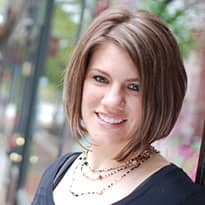 |
| Photo by: Maki Evans |
Although it may get talked about in the local grocery store, not many of us make the national news when we switch churches. However, most of us are not Rachel Held Evans, "the most polarizing woman in evangelical Christianity," according to the Washington Post. Rachel, a New York Times bestselling author who has chronicled her search for a thoughtful and authentic faith in books, blog posts, and through social media, has just published a new bestseller, Searching for Sunday: Loving, Leaving, and Finding the Church.
The book has become a sensation, largely because of the primary storyline being condensed from the book's subtitle: that Rachel, one of America's best-known evangelicals, has left that tradition for the Episcopal Church. However, as she notes in this exclusive interview for Patheos with another evangelical turned Episcopalian, Greg Garrett, you can leave home, but home doesn't leave you, and the story everyone is telling doesn't do justice to the truth.
Greg Garrett: Rachel, thanks for Searching for Sunday, which has already been a gift for me and many others. A friend on Facebook the other day chided me for spoiling your story, which I really kind of did by mentioning where you wind up (although, admittedly, that has also been the lead of almost every feature or review of the book). You've written a beautiful book about going on a quest in search of a more authentic faith, which is something that lots of Americans do at some point in their lives. Why do most of the headlines (and people like me, in less conscious moments!) insist on reducing your story to "Episcopalians 1, Evangelicals 0"?
Rachel Held Evans: I just had this flashback to Princess Jasmine in Aladdin flouncing back her hair and declaring, "I am not a prize to be won!" Clearly all this denominational scorekeeping is because everyone wants a piece of Rachel…(just kidding!)
Or, more likely, it's because we humans have an affinity for labels. They help us determine who's "in" and who's "out," what we support and what we oppose, who we love and who we fear. But the thing is, each person's faith represents a complex amalgam of culture, experience, compromise, and conviction, so very few of our church stories fit tidily into the categories they've been assigned. I attend an Episcopal church, sure, but I still carry with me attitudes and convictions from my evangelical upbringing. Evangelicalism is like my religious mother tongue. I could no more "walk away" from evangelicalism than I could "walk away" from my parents.
Madeleine L'Engle said, "The great thing about getting older is that you don't lose all the other ages you've been." I think the same is true for our faith traditions. Each church stays with us, even after we've left, adding layer after layer to the palimpsest of our faith. The problem is, the headline "Author Explores the Beauty of a Variety of Christian Traditions Through the Imagery of Seven Sacraments" isn't as snappy or interesting a headline as "RHE Ditches Evangelicals for the Mainline," so we end up talking a lot about our respective denominational teams.
Greg: What do you think people from your original tradition misunderstand about your journey? What about the parishioners at St. Luke's, Cleveland, TN, rightly pleased you've come to worship with them? What do they misunderstand about where you came from and what that's made you? Are there ways that people like you and me and Scot McKnight and others who have a foot in two traditions can be somehow a gift to both?
Rachel: I think we all have the tendency to misunderstand one another by assuming people make decisions about faith and worship lightly. I spent a lot of time talking to readers in researching this book, and very few made the decision to leave a church, or stay in a church, out of shallow, consumerist impulses on the one hand or unthinking, uncritical allegiance on the other. So I think it's important to respect the complexity of people's journeys. I'm fortunate to worship with an Episcopal community that, because of its location in the Bible Belt, draws quite a lot of folks from the evangelical tradition. The rector, for example, grew up Southern Baptist. So there's a lot of respect for (and even some integration of) evangelical culture at St. Luke's, and I love that.





